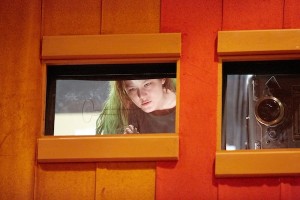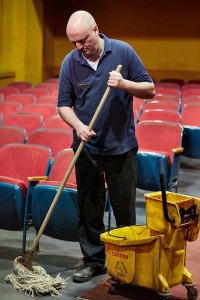In praise of evanescence
by Mika Provata-Carlone
The Flick at the National Theatre © Mark Douet” width=”310″ height=”207″>
“Wondrous, devastating, hilarious, and infinitely touching. A play to be treasured.” The New York TimesA sense of bemused confusion and intrigued curiosity is the audience’s first impression of David Zinn’s set for Annie Baker’s The Flick, currently at the National Theatre following a strong and successful season in New York, where it won the Pulitzer Prize for Drama. There are seats on either side of the space that ought to contain both stage and stalls, seats in neat, ineluctable rows divided by dogmatic aisles leading to fronts that are also rears and vice versa. Until everyone is seated, it could be anybody’s guess where the play begins and where reality stops. Seen from the balconies, Zinn has marked out the space of a duel, of a clash between what is real and what is not: one set of seats faces the other like army battalions of old, defying and questioning the very premise of each other’s existence. Even the title asks us to query and doubt our own perception and engagement: a flick is a cinema film or in this case the name of the venue where films still make their appearance the old-fashioned way – from grunting projectors using proper celluloid reels. Are we the observers observed? In or out of a story that we are made to feel will be suspenseful, significant, selectively sharp in its intelligence, just as arthouse films are discerning in their audiences and themes?
A dramatic beginning clarifies friend from foe: the true stage is the one devoid of an audience, the emptied auditorium after the last screening of the day. Final end-credits are being projected, invisibly to us, from the projection room above the stage, the music is still on, yet there is no one to see or listen. Our attention span is too short for the full experience of visual storytelling on the screen, for the textuality inherent to any movie. After a long (rather too long) atmospheric pause, the Exit door to the right opens and two figures make their way importantly and at the same time casually onto the stage: two cleaners and their gear, one young, almost too young, one old, perhaps a little too old for this job. A rather Beckettian exchange follows, as the minutiae of the cleaning drill are passed on from the older to the younger member of this intentionally incongruous duo. Appropriate philosophical weightiness supplements, we are intended to feel, the rather dire minimalism of words, gestures, plotline.

The Flick at the National Theatre © Mark Douet” width=”310″ height=”207″>
“A slow-brew, absorbent experience so seldom offered in the hyperspace of attention-deficit culture.” Vanity FairThis same pattern – the two cleaners and a projectionist appearing and disappearing after an invisible screening of end-credits under the sound of stereotypically recognisable film scores – is repeated throughout the three and a half hours of the performance. The conversation ranges from what to do with soda spills or toilet filth to an analysis of what constitutes a memorable film, a real cinematic masterpiece, and the two prime contestants for the title, Pulp Fiction and Avatar, indicate to us that this play must be about stark reality and virtual worlds, brutal, unflinching, subversive realism, and delusions of meta-critical CGI escapism; about Cinema Paradiso and glorified computer games. We have diatribes on love (or sexual passion and impassivity), depression and the advantages or disadvantages of suicide, the normal, the deviant and the para-normal, Facebook, shutter-speed and frame sequences, college debt. This cinema, The Flick, and especially the insularity of its auditorium and projection room, become a claustrophobic metaphor for existence, for real-time action in the otherwise intangible, almost incorporeal lives of its three characters: “Sam, 35, shaved head. Caucasian… Avery, 20, African-American, bespectacled, he wears red, slightly European-looking sneakers… Rose, 24, Caucasian, sexually magnetic, despite the fact that (or partly because?) her clothes are baggy, she never wears make-up and her hair is dyed forest-green” according to Baker’s script. There is a fourth character who makes an appearance of only a few minutes, if that, at the end: “Skylar, 26, The Dreaming Man”, who comes after The Flick is sold and converted from conventional to digital projection, knows the cleaning routine to a fault, and soberly de-dramatises any metaphysical pretentions, bursting the bubble without the slightest qualm.
The emphasis on trivia and volubly hinted grand themes, on highly prescriptive stage directions about pauses, actions, music and light, words, movement and silence, references a cornucopia of experimental styles and schools of dramaturgy, from kitchen-sink to the absurd, to politically engaged, statement theatre. The acting is strong throughout, with two of the actors transferring straight from the New York stage, Matthew Maher as Sam and Louisa Krause as Rose, whereas Sam Gold, who directed the play on both sides of the Atlantic, conjures up Annie Baker’s script with gusto and panache, and perhaps with certain changes in the NT production, such as “the pure cry of agony/unrequited love” that Sam is meant to address to Rose to attract her attention at the beginning of the play, which sounds more like a primal cry of compulsive aggression on the Dorfman stage.

The Flick at the National Theatre © Mark Douet” width=”207″ height=”310″>
“This is like no other play in London. It moves at its own unhurried pace and magically exposes the souls of lonely people in danger of being left behind in our new, digitised age.” GuardianYet there is a feeling of almost too much and too little in The Flick. For all its effort to shake and shock us, to make us engage and empathise with the characters on stage and their lives or their tragic predicament and fatal errors, this is more like a draft in process than an actual play. The clever tricks are too numerous, the not-so subtle double-entendres rather heavy. The four central threads – drifting lives, racial pragmatism, awkward or misdirected youth and virtual perfection versus fallible authenticity – fail to take on flesh and blood, regressing to a level of casual utterances. What would have gripped and pierced us in a Beckett, Ionesco or Pirandello play as existential stagnation, the dignity of despair, the oppressive introspection of a life, here looms as mere triviality, an egocentric, rather flaccid and often verbally flatulent exercise in sophism as opposed to philosophy and to a serious examination of the human condition or the state of our humanity. The Flick, instead of being an elegy to the small things in life, to people too imperceptible to be considered significant, feels, sadly, almost like a panegyric to a vacuous existence, its intended message slipping obscurely away, a little like the credits at the end of a film. It feels perhaps too complacent: we, the audience, have shared three and a half hours with lost souls and tatters of lives, have been exposed to great questions with the focus of a flashing, flickering screen, in a quick succession of frames without transitions. What The Flick lacks is the confidence that essence matters, that engagement and attachment are possible, a balance between the transcription of states of the everyday and the gaze of recognition of what is adequate and what is not. It lacks, oddly enough, the charm of being purposeful without a purpose.
From top right: Louisa Krause (Rose), Jaygann Ayeh (Avery) and Matthew Maher (Sam) in The Flick at the National Theatre © Mark Douet
The Flick by Annie Baker continues it’s sold-out run at the National Theatre to 15 June.
Contact the box office for limited Friday Rush or day tickets.
More info
Mika Provata-Carlone is an independent scholar, translator, editor and illustrator, and a contributing editor to Bookanista. She has a doctorate from Princeton University and lives and works in London.

